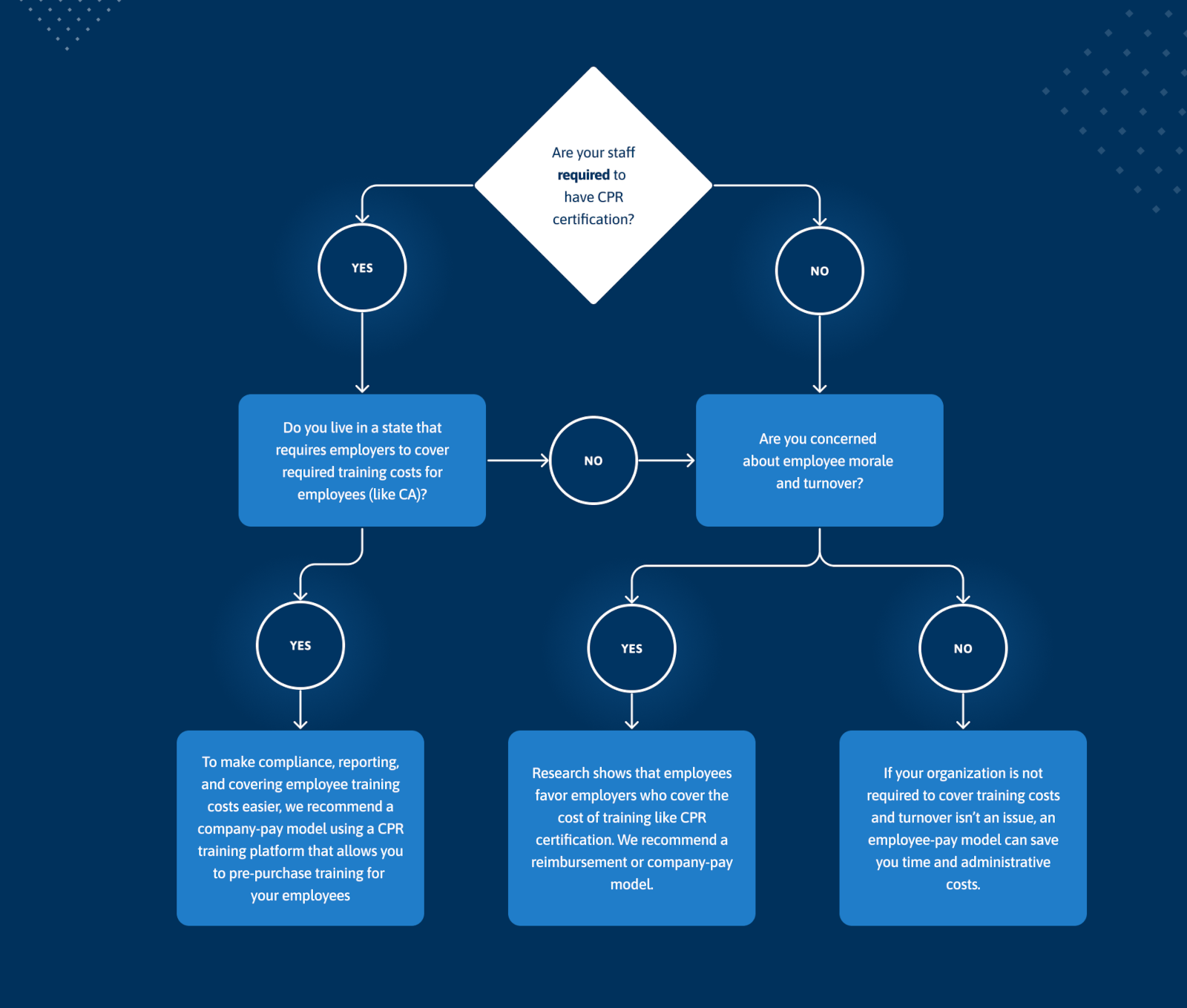CPR is a life-saving skill that everyone benefits from knowing — but in situations where employees are required to obtain CPR certification per the terms of their employment, it can be unclear who should cover their CPR certification cost.
Should employers foot the bill for this essential skill and job requirement? Or should employees take ownership of their own training and costs to prepare for new job opportunities?
Read on to explore the benefits and drawbacks of both scenarios, what you can expect to pay, and tips on making the process more streamlined and simple for everyone involved.
Who Should Pay for CPR Certification?
When setting your CPR certification requirements and company policies on who should cover the costs, you’re likely considering three possible scenarios:
- Option 1: Employees Cover the Cost of CPR Certification
- Option 2: Employees Cover the Cost Initially & Employers Reimburse Staff for Completed Certifications
- Option 3: Employers Pre-Pay for CPR Certification
There are pros and cons of each option.
Employee Pay Pros & Cons
On the one hand, employees may consider CPR certification an investment in their careers that makes them more appealing to employers. In fact, the hiring gurus at Indeed.com reported that out of over 120,000 surveyed applicants, 61% percent reported that having a form of First Aid Certification on their resume helped them to get their current role.
However, many employees are reluctant to pay for any work-related expenses and may be more likely to apply for jobs where employers are proactive about covering the cost of required training. Doing so can also have an impact on employee morale and lower employee turnover.
Company Pay Pros & Cons
When it comes to costs associated with paying for your staff’s training, organizations range from considering CPR certification costs a small, negligible budget line item to a large expense that rivals other essential business services. In addition to impacting employee morale and turnover rates, another big consideration to factor in are the laws for your area.
The Fair Labor Standards Act (FLSA) doesn’t dictate that employers pay for training costs beyond paying for time worked. This differs from policies such as the California Code of Regulations that specifically state that any mandated training be paid for by the employer. Be sure to check your state’s laws and regulations before setting your organization’s CPR certification cost policy.
Another important consideration is staff turnover and retention. There’s no doubt that employee turnover is one of the most challenging pain points employers and HR professionals have to deal with. Offering employees benefits such as having their CPR certification costs covered can go a long way toward retaining employees.
A 2018 LinkedIn survey found that an overwhelming 94% of staff felt that they’d be more likely to stay at a company if the company invested in their careers. This often overlooked opportunity for staff retention can far exceed the CPR certification cost and can be a great way to decrease employee turnover while also ensuring staff are prepared for emergencies.
What Can You Expect to Pay for CPR Certification
If you do opt for a company-pay policy, your next step is to decide if employees should be reimbursed or if your organization will pre-pay for CPR certification.
In a survey of home health organizations, ProTrainings found that of those asked, only 17% required employees to cover the initial cost of CPR certification and would later reimburse their staff. Of those 17%, many found reimbursement to be time consuming and frustrating for both employees and administrators.
With the added benefits of improving employee morale, lowering turnover, and removing the hassle of reimbursement, company pre-pay policies are becoming more and more common for employers who require CPR certification.
But what can you expect to pay as the employer?
CPR certification can range from $15 to $150 per certification depending on the program you choose and if you need to buy equipment for a hands-on skills evaluation.
If you decide to use a reimbursement model to pay your employees back for their CPR certification costs, you also need to factor in the administrative costs of doing so.
How to Choose What’s Right for Your Group
The decision on whether or not to cover the cost of your team’s CPR certification depends on the requirements your employees need to adhere to, the laws and regulations your organization needs to adhere to, and whether or not your organization is struggling with staff turnover or low morale.
To help you make the right decision for your organization, use the decision tree below:

Once you know which model is right for your organization, you can begin to implement a streamlined process across the board.
If you do choose a company-pay model, consider automating your CPR costs and certification process to minimize your administrative costs and time burdens.
Automate Your CPR Costs & Group Certifications
At ProTrainings, we understand how important it is to maintain compliance with governing organizations you have to answer to, as well as to be able to easily generate compliance reports in case of an audit.
That’s why we work with you to find the ideal training program that can help you get your staff certified in a single, streamlined process, house all of your certification records in one administrative dashboard, and simplify the expense of covering CPR certification costs.
Not only does the ProTrainings platform make it easy to pre-pay or pay-as-you-go to cover your team’s CPR certification costs at $39.95 per certification, but also the admin dashboard saves your HR and admin team time and frustration. No more chasing your team down for certifications or proof of renewal to protect against a compliance audit!
In addition, your team will receive automated reminders about their certification expiration dates, easy renewal options, and skill refresher videos throughout the year. Plus, your admin team will love our one-click compliance reporting in the event of an audit.
By saving your HR department time and hassle on managing certification expirations and matching your needs with either bulk purchases or an automated pay-as-you-go system to ensure your staff has easy access to quality trainings that help make compliance concerns a thing of the past, ProTrainings is here to help.
Contact us today to learn how ProTrainings can help make getting your staff CPR certified easier and more efficient.

